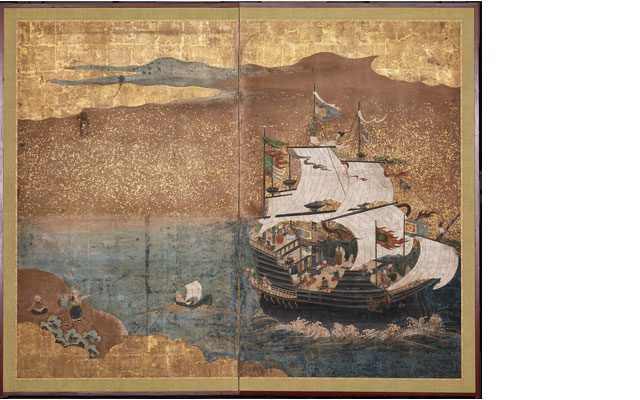
Date/Time
Friday, February 1, 2019
9:30 am PST – 4:45 pm PST
Location
William Andrews Clark Memorial Library
2520 Cimarron Street
Core Program 2018–19
Making Worlds: Art, Materiality, and Early Modern Globalization
Conference 2: Material Flows
—organized by Bronwen Wilson (UCLA) and Angela Vanhaelen (McGill University)
co-sponsored by the Social Sciences and Humanities Research Council of Canada (SSHRC) Insight Grant
Narratives of colonialism, empire building, and religious mission—of center, periphery, and globalization—have been under revision in recent years in order to nuance our understanding of what were immensely complex and multi-faceted phenomena. The Clark Library’s 2018–19 Core Program will shift the focus from governing regimes and institutions to ways in which creative forms and practices were intertwined in the dynamics of materiality and early modern globalism. Such a proposition directs analysis toward the flow of materials, artifacts, and motifs across borders and bodies of water. It attends to experimentation that activated and responded to this traffic in things; it investigates these interactions as constant, on-going processes, thereby bringing innovation, ornamentation, improvisation, and sensation to the fore.
Such interactions were given impetus by an efflorescence of cosmopolitan spaces in the seventeenth and eighteenth centuries. These are cities, ports, exhibition sites, ships, caravanserais, markets, museums, theaters, and warehouses. They are spaces that are open to becoming something new, provisional instead of fixed in their form; they are not inherently hierarchical nor merely commercial, but inflected by global relations of power; they are spaces in which distance and presence are brought into consideration with each other. They are spaces through which people of diverse ethnicities, faiths, and vocational interests came and went. Allowing for convergences, reorientations, and interconnections, cosmopolitan spaces propelled people and artifacts in unexpected directions, giving rise to new ways of thinking.
Material Flows will consider the flows, circuitry, and transformations of materials, motifs, styles, artistic vocabularies, and practices across geographical boundaries. Recent considerations of transnational studies and the global turn have prompted a shift away from area studies, state formation, and fixed borders to take into account concepts such as mobility and cultural entanglement. Papers will take up artifacts and motifs, tracing their circuitry and their paths to explore the implications of global movement and material flows.
Image
Southern Barbarian (Nanban-jin) Boat
Formerly attributed to Kano School (Japanese)
17th century. Courtesy of Museum of Fine Arts, Boston
Speakers
Daniela Bleichmar, University of Southern California
Chanchal Dadlani, Wake Forest University
Cécile Fromont, Yale University
Payton Phillips Quintanilla, Ahmanson-Getty Postdoctoral Fellow
John M.D. Pohl, University of California, Los Angeles
Ayesha Ramachandran, Yale University
Benjamin Schmidt, University of Washington
Allison Stielau, University College London
Valerie Traub, University of Michigan
Thijs Weststeijn, Utrecht University
Julian Yates, University of Delaware
Future Programs for Core Program 2018–19
Making Worlds: Art, Materiality, and Early Modern Globalization
Conference 3: Other Worlds
Friday May 3, & Saturday, May 4, 2018
Program
9:00 a.m.
Morning Coffee and Registration
9:30 a.m.
Helen Deutsch, University of California, Los Angeles
Welcome
Bronwen Wilson, University of California, Los Angeles
Angela Vanhaelen, McGill University
Opening Remarks
9:45 a.m. Session 1
Chair: Rachel Weiss, Ph.D. Candidate, University of California, Los Angeles
Thijs Weststeijn, Utrecht University
“Images and Ideas of China in the Dutch Golden Age”
10:15 a.m.
Daniela Bleichmar, University of Southern California
“Interpreting Mexican Objects in Early Modern Collections”
10:45 a.m.
Discussion
11:15 a.m.
Coffee Break
11:30 a.m. Session 2
Chair: David Bardeen, Ph.D. Candidate, University of California, Los Angeles
John M. D. Pohl, University of California, Los Angeles
“Masked Alliances: A Dutch Forced Economy Reflected in the Art and Performance Rituals of Indigenous Populations”
12:00 p.m.
Benjamin Schmidt, University of Washington
“The Flow of Fumi-e: Icons, Objects, and Currents in the Early Modern World”
12:30 p.m.
Discussion
1:00 p.m.
Lunch
2:15 p.m. Session 3
Chair: James Clifton, Sarah Campbell Blaffer Foundation
Allison Stielau, University College London
“Melt Value”
2:45 p.m.
Payton Phillips Quintanilla, Ahmanson-Getty Postdoctoral Fellow
“Mining the Theater: Metals and Other Matters in the New World and the Old”
3:15 p.m.
Discussion
3:45 p.m.
Break
4:00 p.m.
Julian Yates, University of Delaware
“Gold You Can Eat: Oranges and the Gains of Trade”
4:30 p.m.
Discussion
4:45 p.m.
Reception
After booking Day 1 below please remember to also book your spot for Day 2.
Booking Form
Bookings are currently closed for this event.

